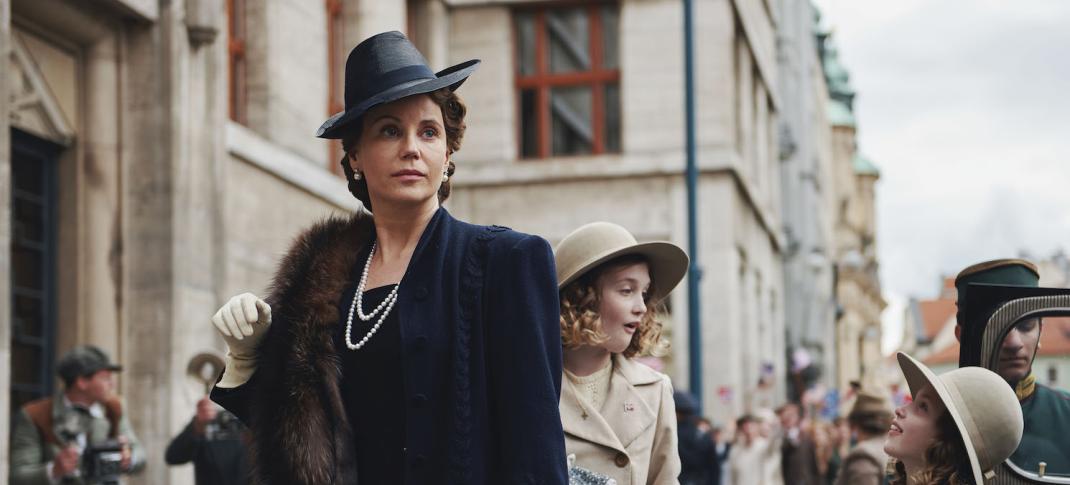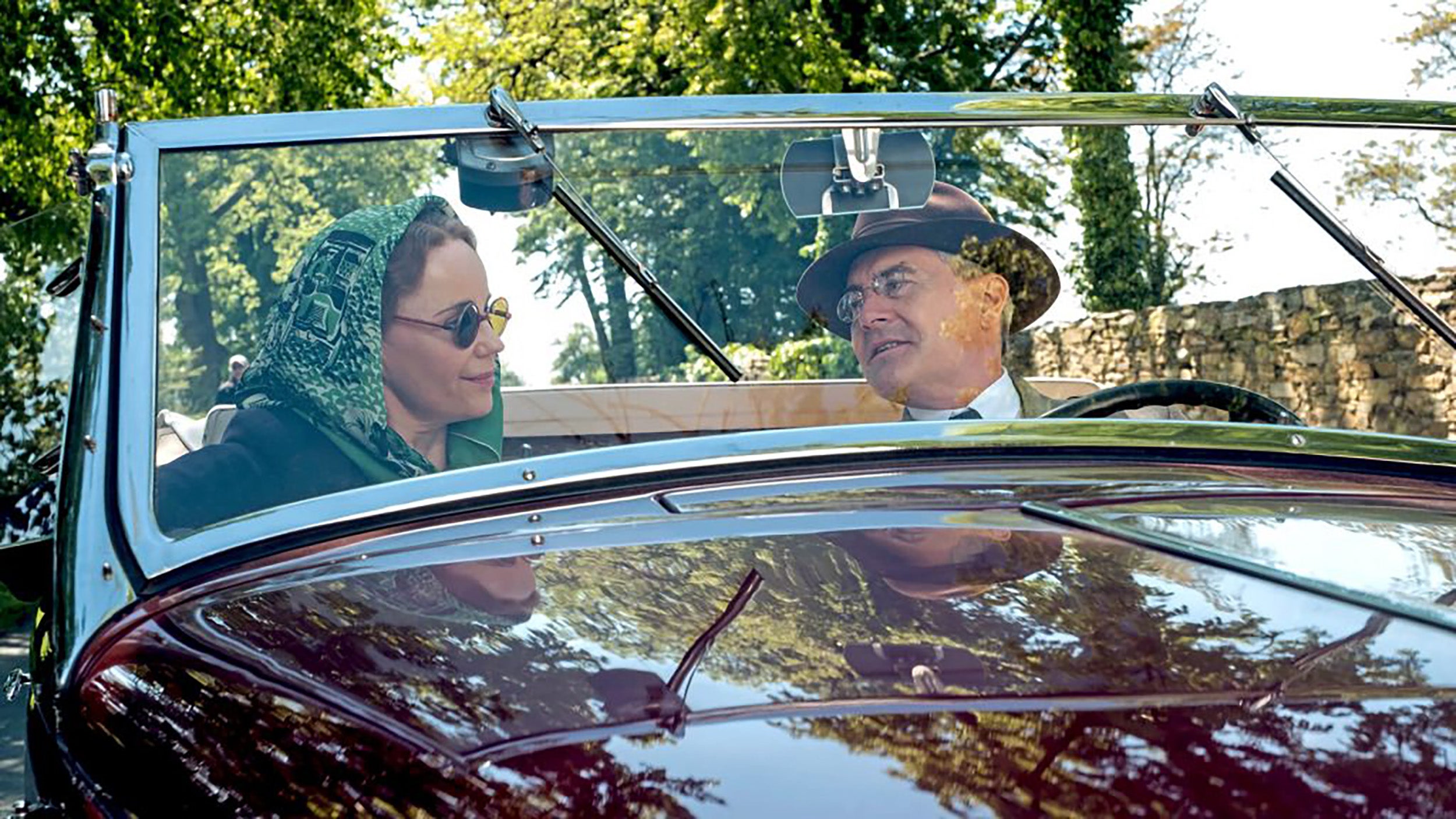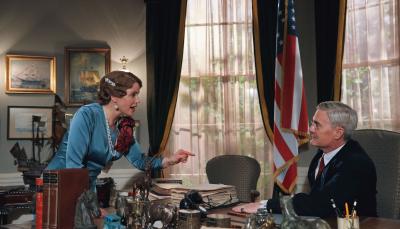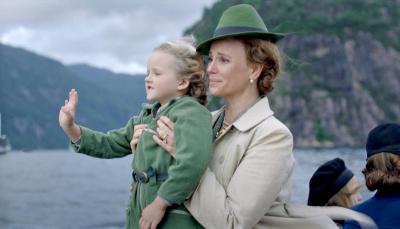An All-American Welcome Greets 'Atlantic Crossing' Episode 3

Sofia Helin as Crown Princess Martha
Masterpiece/Juile Vrabelova
Episode 3 of Atlantic Crossing opens in Scotland, where Olav and General Fleisher (Stig R. Amdam) are gloomily drilling the Norwegian Brigade. The recruits are volunteers from whaling ships, who may have a great attitude and harpoon skills, but are of little use since the Allies won’t allow them to use weapons. Fleisher believes that the Allies will support an invasion to seize control of Norway’s iron ore, but Olav is skeptical, before being distracted by learning that the course of the ship carrying his wife and children to the U.S. has been altered by the Americans, and is now crossing a minefield.
We’re plunged right into a very unsettling scene. Lifeboats have been lowered to the sides of the ship, where Norwegian sailors, most of whom look very young and frightened, scan the water for mines. An alarm goes off, and Märtha, telling the children it’s just a drill, takes them on deck. Her daughters, dealing with anxiety and missing their father, bicker, and as Märtha tries to restore order, Harald wanders off in search of diversion. In the family’s cabin, he finds his mother’s purse and opens the small pillbox containing some pretty, turquoise-colored candy. His mother bursts in, horrified, and pries the cyanide pill from his mouth.
Olav learns, to his relief, that the ship has arrived safely in New York, where Märtha throws the cyanide pills into the sea as they sail past the Statue of Liberty. “Now we are safe,” she says. Her children are excited by the sights of New York, and she films them on her movie camera. At the Waldorf-Astoria Hotel, she’s greeted by a crowd waving Norwegian flags, and then by Ambassador Morgenstierne (Trond Teigen), who’s arranged a press conference with an enthusiastic group of journalists. But Märtha insists that she call London to talk to Olav first.
On the phone with her husband, Märtha lets her guard down, and we see how vulnerable and stressed she really is. Her greatest fear has been that Olav would be captured and killed by the Germans, and she has lived with this uncertainty for too long. She wants Olav to join her in the U.S., but he can’t because his first duty is to the King his father. She tells him she doesn’t know how long she can cope on her own, and after the call, she has a full-blown panic attack. Ragni takes care of her until she feels well enough to start the press conference. With uncharacteristic hesitance, she reads the statement the Ambassador has prepared for her and is then unnerved by a barrage of questions and camera flashes.
But she’s cheered by an invitation from President Roosevelt to visit him at his country home, where he greets her from his wheelchair (an indication of the trust he places in her) and produces presents for the children. He is surprised, and not very pleased, to see that Morgenstierne has accompanied her, and we later see the Ambassador being hustled out of the house. Eleanor is not there, but Roosevelt’s secretary, Missy Lehand (Lucy Russell), hovers protectively.
Roosevelt is delighted to see Märtha again and lures her away for a drive. It’s a heady combination for him—being in charge of his own movements, on a beautiful day with an attractive woman for company. Happy days are here again, indeed. (He sings along to his campaign song on the radio.) After driving down a side road to evade his Secret Service escort, he continues the drive and their discussion about where Martha and her family are to live. A place has been found in Massachusetts, and she'd prefer New York, but he tells her that she has the freedom to choose where to live.
Olav and Fleisher are back in Buckingham Palace, where they are playing bridge with King George VI (who goes by Bertie to family). The combination of Palace formality, boredom, and their frustration with a lack of action prompts Fleisher and Olav to tease the King. Fletcher asks Bertie what sort of security system they have, in case German paratroopers attack the Palace. Bertie tells them he has a special alarm button in his study, and the two Norwegians, intensely amused by the shy, diffident King, insist upon inspecting it. Yes, it looks like an ordinary light switch, but it’s hidden behind a curtain. And does it work? Bertie calls their bluff and presses the button. An alarm rings.
Across the Atlantic, Märtha enjoys a picnic with Roosevelt and Missy, and they’re joined by the Roosevelts’ masseuse, Eliza Forbes (Kirsti Lovas), a Norwegian immigrant whom Ragni has befriended. After a few lutefisk jokes, Roosevelt returns to the discussion of where Märtha should live. He compares Boston to a “stalwart old farmer,” while New York City is too brash and young; he claims that Washington, D.C., is the natural choice for her, with its air of European sophistication. He invites Märtha and her family to stay at the White House.
But the light-hearted discussion is cut short by a whispered conversation with an aide. London is being heavily bombed. Märtha, distraught, tries to call Olav, but cannot get a line. She cries on Ragni’s shoulder and although the two women have shared so much, including separation from their husbands, for Ragni it’s clearly a breach of protocol. She can’t allow herself to hug her Princess back. It’s yet another reminder of Märtha’s isolation.
Meanwhile, in the basement of Buckingham Palace, as London burns and the building quivers with the impact of striking bombs, Olav and the King once more debate Norway’s direction in the war. Olav wants to go to the U.S. because it’s neutral and has a large Norwegian population. He doesn’t have much faith in Britain’s chances, and if Britain is defeated, it’s the end for Norway. Or, how about Canada? That night, Buckingham Palace suffers some damage from bombing, and Queen Elizabeth offers her famous comment that now she can look the East Enders of London in the eye.
Finally, Olav and Märtha are able to speak on the phone, and while Olav teases her about being on first-name terms with Roosevelt, he supports her decision to move the family to the White House. What better place to argue Norway’s cause? But he can’t join them so long as England is at war; he has no choice now but to stay and fight. So Märtha returns to watch indulgently as her children splash in the White House Pool, swimming with Roosevelt, who enjoys their company and hers.
But she won’t take up his challenge to a race and leaves with Ragni to change. The two women indulge in a little gossip. Märtha is intrigued by Missy’s status—she seems almost like a wife! Ragni reports juicy rumors about Missy’s NYC apartment (who on earth could that be financed by?) and warns her that Roosevelt is obsessed with her. Märtha dismisses her concerns—the President is just being kind.
Behind the scenes, Missy harangues Roosevelt for taking in “stray royals.” This is an election year, and the message to the American people will be that he’s soft on Europe. Roosevelt escapes (or so he thinks) to consult with Eleanor, who wants him to grant political asylum for a shipload of Jewish refugees from Europe. (If this is meant to be a reference to the St. Louis, it took place a year earlier in 1939, but then this is a series based on historic events.)
Olav and Fleisher are still wrangling with the British and their own Cabinet. Fleisher believes that they’ll get to either Canada or the U.S., but then tells Olav it’s against his recommendation. The British want to train Norwegian pilots for the RAF, and an invasion of Norway has been rejected. Olav is not happy. Meanwhile, the Norwegian Cabinet continues to pick fights with each other, united only by their dissatisfaction with Fleisher, who, despite being a World War I veteran, is disliked for being “too belligerent.”
Whatever plan the Norwegians cook up will have to be approved by Churchill, and it’s becoming clear that the only way Norway is to survive is to ensure Britain’s survival. And it’s becoming vitally important that Ambassador Morgenstierne meets with Roosevelt.
During breakfast at the White House, Märtha’s children are now happily addressing Roosevelt as “Grandpa,” while Missy’s not at all shy about expressing her resentment of the family. She pointedly asks Märtha when they’ll be moving out of the White House, and in fact, Märtha and Roosevelt are off on a house-hunting trip that very day! Or strictly speaking, a mansion-hunting trip, since she is drawn to Pook’s Hill country estate, a thirty-minute drive from the White House. Märtha, who is fully aware of Missy’s jealousy, gently confronts her on their return, assuring her that she presents no threat to the White House status quo, but Missy is having none of it, telling her that if Hitler wins, she will be queen of nothing.
This post was originally published April 2021. Updated 6.29.2025
Atlantic Crossing continues on Sundays at 10 p.m. ET on most PBS stations, the PBS app, and the PBS Masterpiece channel, and will air and stream weekly through the end of July. All eight episodes are available as a binge for PBS Passport members. As always, check your local streaming service/listings.








